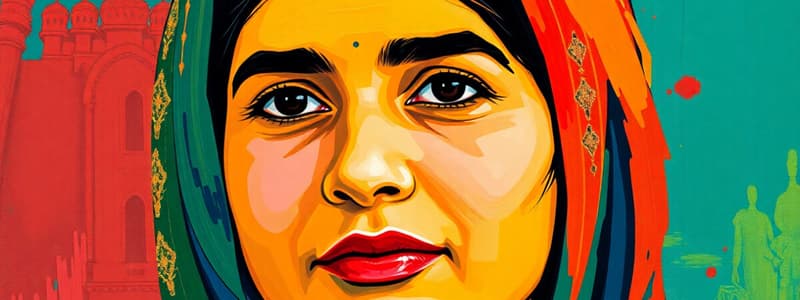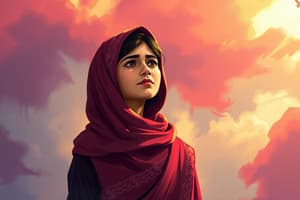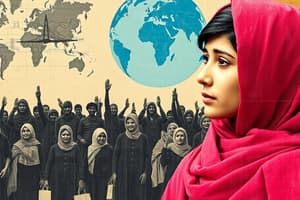Podcast
Questions and Answers
What was the primary reason the author's family was 'glued to the TV' upon Benazir Bhutto's arrival in Pakistan?
What was the primary reason the author's family was 'glued to the TV' upon Benazir Bhutto's arrival in Pakistan?
- They admired Bhutto's courage to speak against terrorists and hoped for her safety despite the danger. (correct)
- They believed Bhutto's return would instantly resolve the ongoing conflicts and struggles in the country.
- They were eager to witness a woman defy cultural norms and enter Pakistani politics.
- They anticipated Bhutto's arrival, knowing she would bring immediate economic relief to their region.
Why was the author so shocked by Benazir Bhutto's assassination, despite the existing fear?
Why was the author so shocked by Benazir Bhutto's assassination, despite the existing fear?
- The author felt that the terrorists would not act against such a high profile member of the government.
- The author assumed that the Pashtunwali code, which prohibits the killing of women, would deter an attack on Bhutto. (correct)
- The author believed that Bhutto's political position would protect her, and that her popularity made her untouchable.
- The author had inside information suggesting Bhutto was working with the terrorists, so the assassination was unexpected.
What realization did the author come to after witnessing Benazir Bhutto's assassination on TV?
What realization did the author come to after witnessing Benazir Bhutto's assassination on TV?
- The author decided that the only option to escape the violence was to seek refuge in another country.
- The author believed that Bhutto's death would mark the end of women's involvement in Pakistani politics.
- The author understood that if a prominent figure like Bhutto could be targeted, then no one in Pakistan was truly safe. (correct)
- The author was sure that Pakistan would descend into complete chaos and anarchy with the loss of its leader.
What internal response did the author have while watching the reactions of adults around her on TV?
What internal response did the author have while watching the reactions of adults around her on TV?
What was 'the secret' that the author kept to herself as everyone around her cried?
What was 'the secret' that the author kept to herself as everyone around her cried?
What does the statement, 'Not the children who worked in the trash heap,' imply about the societal conditions in Pakistan at the time?
What does the statement, 'Not the children who worked in the trash heap,' imply about the societal conditions in Pakistan at the time?
What is the significance of the author mentioning her recent interviews with Dawn and Khyber News in the context of Benazir Bhutto's assassination?
What is the significance of the author mentioning her recent interviews with Dawn and Khyber News in the context of Benazir Bhutto's assassination?
Why might the author's mother be both 'moved' and 'afraid' by Benazir Bhutto's return to Pakistan?
Why might the author's mother be both 'moved' and 'afraid' by Benazir Bhutto's return to Pakistan?
What does the author's realization, 'If Benazir Bhutto can die, no one is safe,' suggest about the rule of law in Pakistan at the time?
What does the author's realization, 'If Benazir Bhutto can die, no one is safe,' suggest about the rule of law in Pakistan at the time?
What does the author mean when she says, 'I will continue this journey of fighting for peace and democracy in my country,' despite being only ten years old?
What does the author mean when she says, 'I will continue this journey of fighting for peace and democracy in my country,' despite being only ten years old?
Flashcards
Malala Yousafzai
Malala Yousafzai
A Pakistani woman and activist for girls' education.
Benazir Bhutto
Benazir Bhutto
The first female Prime Minister of Pakistan who was assassinated.
Pashtunwali code
Pashtunwali code
A traditional code of ethics among Pashtuns that prohibits the killing of women.
Extremism
Extremism
Signup and view all the flashcards
Activism for education
Activism for education
Signup and view all the flashcards
Impact on society
Impact on society
Signup and view all the flashcards
Gunfire incident
Gunfire incident
Signup and view all the flashcards
Feelings of fear
Feelings of fear
Signup and view all the flashcards
Courageous return
Courageous return
Signup and view all the flashcards
Awareness of rights
Awareness of rights
Signup and view all the flashcards
Study Notes
Malala Yousafzai's Experience
- Malala Yousafzai, a young woman, was a role model for girls, advocating for their rights
- She was a politician opposing terrorists
- Her arrival in Pakistan was broadcast on TV; her family watched
- Malala's family was concerned about her safety due to political climate
- Malala was shot and nearly killed on TV
- She stated, "We will defeat the forces of extremism and militancy with the power of the people"
- She was standing in a bulletproof vehicle when she was shot
- Malala's family and loved ones were devastated by the attack
- Benazir Bhutto, the first woman attacked by terrorists, was mentioned.
- Killing of women is forbidden in the Pashtunwali code
- Malala's sense of safety in Pakistan was challenged by the attack
- She was only 10 years old when the assassination attempt occurred.
- Malala continued her work advocating for women's rights.
- She interviewed for TV news channels about girls' education.
- She believed she would continue fighting for peace and democracy.
Studying That Suits You
Use AI to generate personalized quizzes and flashcards to suit your learning preferences.




